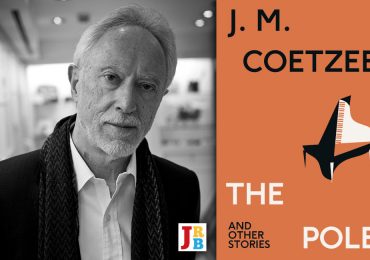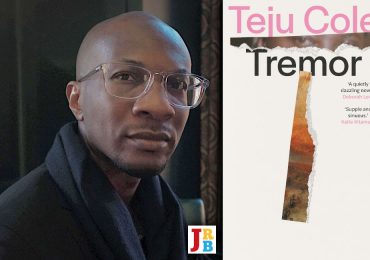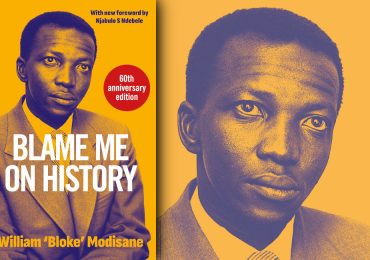The JRB presents the three winning stories from this year’s Short Story Day Africa Prize.
Nigerian writer Tochukwu Emmanuel Okafor won the prestigious award for his story ‘All Our Lives’. For the first time in the prize’s five-year history, two stories were jointly awarded second place: Agazit Abate’s ‘The Piano Player’ and Michael Yee’s ‘God Skin’.
*
Editor’s note, September 2019: a year after Okafor was announced as the SSDA Prize winner, similarities between his short story and that of another writer, ‘Wanderlust’ by Laleh Khadivi, published in 2014, came to light. This caused the Caine Prize for African Writing to withdraw Okafor’s story from its 2019 shortlist. You can read more on this story at James Murua’s African literature blog, and find the Caine Prize’s statement here. As of the time of this note, Okafor’s story remains the SSDA Prize winner.
*

The prize is worth $800 (about R10,000) and open to any African citizen or African person living in the diaspora. All twenty-one longlisted stories are published in this year’s SSDA anthology, ID: New Short Fiction From Africa.
Read on, and enjoy:
~~~
The Piano Player
Agazit Abate
Joint runner-up for the 2017 Short Story Day Africa Prize
Don’t walk too fast. Look straight ahead. Nobody is watching you. Nod to the waiter who doesn’t know your name. Focus on the destination. Think about the routine. No eye contact with any of the guests. When you start playing, the music will be a surprise if they hear it. You’re almost there. Two more steps. Now, take your seat.
Fifteen people in the lobby today. I saw shadows, of course, not actual faces. To see their faces, I would have to look at them. I see silhouettes, the safest way to view people. More will come, some will leave. Fifteen people is good for a Monday night. For the hotel, not for me. It doesn’t matter to me how many people show up. Seven songs before the break and seven songs after. It’s always the same. Well, no, that’s not true. Sometimes it’s eight songs before, six after. Five songs before, seven songs after, six songs before, and five songs after.
It’s easy to change your routine when nobody is paying attention. The waiters and waitresses are too busy thinking about their tips and how much of their service charge management will take from their pay. Management is focused on the number of people in the lobby, who’s ordering food and who’s ordering tea, who’s here to eat and who’s here for the WiFi. Mostly, they’re all thinking about the guests in the hotel who give them extra money and how to service their needs. If they ever ask me about the arrangements of the songs or the timing of my break, I’ll tell them that I test the energy of the crowd. It’s a lie, of course. I am facing a wall; the room could be filled with people and I wouldn’t know. Besides, I have never been able to feel an audience’s energy. Audience, in this respect, is used loosely; nobody comes to this hotel for the piano player. They won’t ask because they’ll never notice, but if they do, I can tell them that there are times when people need to hear tizita and other times when they need ‘Banana Boat’. I’ll also tell them that some songs are longer than others, which is true.
Breathe in, G sharp, C sharp, E, G sharp, C sharp, E, G sharp, C sharp, E, G sharp, C sharp, E, breathe out, G sharp, C sharp, E, G sharp, C sharp, E, G sharp, C sharp, E, G sharp, C sharp, E. A girl I knew in primary school used to bite her fingernails. Lots of kids bite their fingernails, but her biting was more pronounced; she bit her nails with the urgency of an acute habit driven by severe anxiety. In class, she tapped her right heel on the ground so fast and for such an extended period of time that if I looked at it for too long, I would get dizzy. I could relate to her, even before I began counting the keys to control my breath.
I wonder what it feels like to be someone whose breathing is automatic. Doctor Tesfaye says that my airways are chronically inflamed, which at times makes it hard for me to breathe. Three hundred million people on this earth have asthma. Quarter of a million people die from asthma every year, mostly from the developing world, all preventable deaths. That’s what it says on Wikipedia. I’m not scared of dying, and my asthma isn’t as bad as it used to be. Still I think it’s good to know how many people on this earth have died of the same affliction that ails me. Of course, this is only the official number. I’m sure many more people have lost their breath without a proper diagnosis. I wonder what the world would be like if everybody was forced to pay attention to their breath. Sometimes I think that there’s nothing wrong with my lungs. Sometimes I think that it’s perfectly natural, at times, to lose your breath.
I stopped breathing when Ayne left to go to America with her family. Eleven is a hard age for a girl to lose her best friend. ‘I’ll write you every Sunday so I can tell you what happened during the week,’ she said to me the day she left. I told her that I would write her every Monday to tell her what I hoped would happen during the week. I begged Gash Gezahegn and Eteye Maaza to stay. I told them that we would be good and get good grades and always come home right after school. They didn’t say anything. Eteye Maaza grabbed me, kissed my forehead, and told me to go play outside with Ayne. I was so upset, I told Ayne that it wasn’t fair, and then I called Gash Gezahegn a fascist. It was a word that I heard our neighbour Fasil use. I didn’t know what it meant, but he was speaking about Mengistu, so I knew it was an insult. Gash Gezahegn heard me and started laughing. He told Eteye Maaza, ‘In this country, everybody is a fascist except for the fascists.’
We began writing to each other right away. Our parents wouldn’t let us send a letter every week, so we would send four letters at once at the end of each month. In Ayne’s first letter to me, she told me about the day she arrived in Dallas, Texas. She said that it was cold, that the streets were big, and that all of the cars drove in straight lines. She said people only honked if something was wrong, and things were very rarely wrong. She wrote about all the family members she had met for the first time. She was in awe of her cool older cousin Nardos, who had a nose ring, big curly hair, and wore black lipstick. She had told Ayne, ‘When you turn eighteen, I’ll take you to get your nose pierced.’ She said that Nardos’s said it out loud, like it wasn’t a secret. Ayne thought it should have been whispered, since Gash Gezahegn was in the next room. She lived with Nardos’ family for a few months until they got their own two-bedroom apartment, where she shared a room with her brother. They slept in what she called bunk beds. She was on the bottom and he was on the top. I was probably as nervous for her first day of school as she was. Luckily, it was painless, and she made friends right away. A girl named Julie asked her if she wanted to sit next to her at lunch. She became friends with her and her friends.
I was happy for Ayne, but missed her deeply. My stories to her always felt less interesting; everything was new in her life, everything had remained the same in mine. I told her about all the kids at school who asked about her. I told her that Mahelet said that she would probably forget Amharic, and if she came back, she wouldn’t be able to communicate with us. I told Mahelet that she was wrong, that Ayne could never forget Amharic. I wrote about Dawit kissing me on the lips in the yard in front of our home. How it was wet, and how I thought that people were making a mistake by kissing on the lips. How I thought that we should just stick to kissing on the cheeks. I told her about the first time I played the piano, and how Wezero Etaynesh played like an angel. I told her that I didn’t think that I could be good at it, but that I wanted to try. Our letters went from once every week to once every month, to every few months, until they stopped completely. Five years after she left, we stopped writing to each other.
Ayne is my Facebook friend now. She is married with two kids and lives in Houston, Texas. It’s not obvious from her posts what she does for work, but her husband is black American, their kids are smart, funny and well-behaved, and she has tena adam, along with red and white flowers growing on her patio. From my Facebook posts, you can tell that I play the piano and that I once went to Abu Dhabi to perform in a concert. Sometimes I think that I got my first asthma attack the moment that Ayne’s plane took off.
‘Hello, my name is Simon. The waiter told me about you?’
‘Yes, I know.’
‘Can I get you a drink?’
‘Coca-Cola, please.’
‘Oh OK, ummm, two Cokes please.’
‘Two Coca-Cola, yes.’
‘So, it’s my first time here in Addis Ababa. It’s an interesting country.’
‘When did you come here?’
‘I’ve been here three days.’
‘You like it?’
‘I work in finance, I never thought I would come here. But really, you know, Africa is so underrated. I mean, this city will be completely different in five years. So many Chinese, though. The Chinese know how to invest. They don’t bother with the details; they pay attention to the big picture. But we have our eyes on this country, too. We’re gonna put some money into this economy. The Chinese have a head start, but they open the door and we come in too, you know what I mean? I mean, we want to do some good here, help the country out of poverty. It’s a win-win situation, you know what I mean?’
‘Yes, I know.’
‘Crazy, all this construction, but so much poverty. There is poverty in America too, in, you know, the ghetto. You know, the Coke here is sweeter than the Coke back home.’
‘It’s sweeter in America, no?’
‘No no, the Coke is definitely sweeter here.’
‘It tastes good with red wine.’
‘With wine? I’ve never heard of that. Excuse me, can I have a glass of red wine?’
‘Yes, sir.’
‘Don’t fill it too high. I’m gonna put some Coke in it!’
‘Yes.’
‘Hmmm, interesting. It’s like carbonated wine. It’s not bad, really sweet, though. Drink some.’
‘No, thank you.’
‘Come on, you have to try it. You made me drink it.’
‘OK.’
‘Hey! That’s Celine Dion!’
‘Yes?’
‘The piano player is playing Celine Dion! You guys know Celine Dion here?’
‘Yes, she is very popular.’
‘Amazing. Celine Dion in Africa. They put me up in a nice hotel!’
‘Yes.’
‘I’m on the fourth floor, really nice view. I mean it’s all construction, but it’s cool. I mean, it’s like I’ll be able to say that I was here when the change happened. You know? This country is just beginning.’
‘Fourth floor?’
‘Yeah, really nice view.’
‘You are ready?’
‘Yeah yeah, I’m ready. Let’s go.’
Not tonight. It doesn’t feel right tonight. But one night, soon, I will play it. If nothing happens, then that means I can do anything here and still have a job the next day, as long as I show up and play. Also, it means that nobody is paying attention to the music. I think people will hear it, but it will be so quick that it will mean nothing. The funeral march for ten seconds, and then back to the regular schedule of songs. I won’t be able to see them and they will only have a view of my back. I’ll reveal nothing in my body language. If there is no eye contact confirming that it happened, then you can’t be sure that it happened.
Maybe I’ll compose my own funeral march. How can I create a song from the cries of hazen using piano keys? Maybe I should do some research. Meseret’s brother died yesterday. I was going to visit them anyway. I’ll go tomorrow and I’ll pay close attention to the sounds. Maybe I’ll record them on my phone. I can listen to it when I get home for inspiration. Would that be morbid? Yes, of course it would be. But I’m an artist. I’m supposed to do strange things. Lady Gaga wore a dress made of meat to an award show. Of course, that’s in America and they do those kinds of things there. It doesn’t have to be morbid. Gash Mulatu went to the south to study the music of some of the people there. He called them ‘scientists in sound’, and com- pared them to Debussy and Charlie Parker because they play diminished scales and create their own version of jazz. He wasn’t researching the sounds of hazen, but still he did research, just as I would do research.
Yes, I’ll compose an original Ethiopian funeral march. It won’t be used at funerals because nobody hires a piano player for funerals here. Maybe that can change, like everything else is changing. The rich are always look – ing for ways that they can be different. If death is the great equaliser, their resistance can certainly create hierarchies of mourning. I could compose a death song for high-class funerals in Addis. An elegy for the rich. I’ll test it out in this lobby. I won’t do it the same way that I would have done the funeral march. I’ll play the full song and then take a break. I’ll walk to the break room the same way that I always walk to the break room, straight lines and no eye contact. But I’ll try to check the pulse of the people, the vibrations of their energy. I wonder if people will feel fear or know to cry.
‘Look at that table. Three of them, and they haven’t talked to each other in the past fifteen minutes.’
‘You’ve been watching them for fifteen minutes?’
‘They haven’t looked up from their phones. What’s the point of even being here together?’
‘WiFi.’
‘Look at her. How much closer can her face be to the phone before her glasses touch the screen? Look at her posture. It’s not good for her back.’
‘Abiye, these are the times that we live in. This is what people do.’
‘We are supposed to socialise. They are going against nature. When you are alone, you must commit to being alone. When you choose to be around people, you should be present with those people. They came here together; they should follow through on the plan to be together. It’s a big problem. Young people today are never genuinely social, and they are never truly alone.’
‘Eshi Abiye, so, where are they?’
‘They don’t even know where they are, how can I know?’
‘Abiye, I mean the stories. Tell me about the stories.’
‘Yes, yes. I didn’t bring anything with me, but as I told you over the phone, I’ve been writing for years now. I am in my eighties, you know. I don’t want to forget anything. I’m telling you this because you are the one who appreciates stories in our family. You know, I always thought that you would be a writer. It’s not too late.’
‘You are right, it’s not too late.’
‘Even today is not promised. You must start immediately.’
‘Eshi Abiye.’
‘I’ve written down all of my memories. Your grandfather and grand- mother’s stories about the Italians. The poison in the river, weapons in cof- fins, the woman who invited five Italians to dinner and how their friends spent the following weeks looking for them in vain. I tried to write it the way that I heard it. The way the woman spent the previous day preparing a feast. They said that she was tall, teyem, beautiful and wore dresses with a thin belt around her waist. I wrote about your father, and how he used to imitate John Wayne before he became a socialist. The day Alem’s father gave me permission to marry her, and the way Robel looked when he was first born. I wrote about our neighbours. Wezero Alganesh and the time she tried to take her husband to court for selling her gold necklace. It’s all there, and I’m still writing.’
‘I didn’t know you were writing, Abiye.’
‘Yes, I’ve been remembering all my life, I’ve been writing for three years now.’
‘My father used to imitate John Wayne?’
‘He went to Cinema Empire to watch Stagecoach at least five times.’
‘Tell me more.’
‘It’s all there, written down. Ask me questions after you read it.’
‘When can I read it?’
‘I need your help organising it and typing it on a computer.’
‘You want to publish it?’
‘I want it to be complete and saved. I want one printed copy for myself and one copy for each person in our family.’
‘It will be a treasure for us.’
‘It is the story of our lives. It is your inheritance…’
‘Abiye, what did the woman do to the Italians?’
‘You will read everything I know soon.’
‘But what happened to her?’
‘She lived. She had nine children and died at ninety-six years old, a face full of history and perfect posture. You will read it all … You know, it really is bad for their backs. They are destroying their bodies, for the sake of what? Why does the phone demand that level of concentration? Look at that piano player. She has to sit straight in order to play. Good posture is important.’
‘You are right.’
‘I asked you to meet me here because I wanted to speak with you in private. But your aunt knows everything. She helped me remember. Next time we will meet at my house.’
‘Tomorrow?’
‘Yes, tomorrow.’
Walking to my seat has always been my favourite part of the performance. Still, I am anxious in those moments. I’m the most at ease on the chair, playing. My second favourite part is walking away.
The first time that I played here facing the audience, I thought that I would quit. I love playing, but I hated playing to them. Perhaps the most forceful I have ever been in my life is the day that I asked the manager to move the piano so that it faced the wall. I told him that it would be more intimate for the hotel guests, live music without the expectation of having to pay attention to the performer. He agreed immediately, and had two of the waiters move the piano. It was fast and easy, the piano was on wheels. I would like to think that he agreed because he knew that I was good, and wanted to appease me. But, most likely, it’s because managing the piano entertainment is such a small part of his job that he didn’t care enough to argue about it. Either way, I get to play free from their eyes and compulsory stares.
‘What song is that?’
‘The one the piano player is playing?’
‘I know that song. What is it?’
‘I don’t know. I don’t recognise it.’
‘I hate this feeling. I know this song. I wish there was a way to Google an audio recording.’
‘I think there is a way to do that.’
‘How?’
‘I don’t know, Google it.’
‘Are you almost finished?’
‘Yeah, I just wrote the last line. ‘With inspiration like this, the Kerkasa Collective is sure to draw long lines at next week’s art exhibit.’ I’m sending it now.’
‘Gobez. This is going to make me crazy. I know this song.’
‘Close your eyes and it will come to you.’
When Nina says that the sun is coming, I believe her. When I play it, I believe me.
‘Beniyam and Meski are getting a divorce.’
‘What? I don’t believe it.’
‘Meski told me herself.’
‘They just got married. It hasn’t even been a year.’
‘I know. I thought that she was going to tell me that she was pregnant.’
‘What happened?’
‘She said that they are too different, that he drinks, and that she doesn’t like his friends.’
‘She didn’t know all of this before?’
‘She said that she hoped that he would change once they got married.’
‘Hope.’
‘She was so upset. I feel so bad for her.’
‘Is she sure?’
‘She said, enquan shimagele, danyam aymelesewom.’
‘She must not love him.’
‘I’m going to see her tomorrow. Let’s go together.’
‘OK. What did Gash Berhane and Adiye say?’
‘I don’t know. I didn’t ask her, and she didn’t say. I’m sure they’re upset.’
‘I can’t believe it.’
‘I know. Life doesn’t always work out the way we plan. After I saw her, Eleni called me to tell me about Henok.’
‘How is Henok? I keep forgetting to ask you.’
‘He’s OK. The house is gone.’
‘When?’
‘Last week. I don’t think that he believed that it would be demolished until they gave notice the day before. Even then, not until the trucks came in. He took down most of the tin to sell and put all of their things in plastic bags. They’re living with my uncle now.’
‘What are they going to do?’
‘I don’t know. He’s trying to get a second job. His wife is saying she wants to go to an Arab country. Her sister is in Jeddah. When he told me the story, he said it in a whisper, like it was too heavy to speak out loud. We told him not to build there, but he was hoping it would work out. He thought it was his only chance of having a place of his own. Now he says that this world has no room for poor people.’
‘He’s right. Hope is dangerous.’
‘They say hope is the currency of poverty.’
‘Who says that?’
‘I don’t know, but I’ve heard it before.’
‘What about Meski?’
‘There are different kinds of poverties.’
‘I can’t believe they’re getting a divorce.’
‘It was a big wedding.’
‘It was a very big wedding.’
I said it out loud and made it appear. That’s what Emaye said. She said that when I called its name, I invited it into the house. Instead of saying its name, she said I should have said that I think I saw my in-laws. Calling it an in-law would have made it stay away. I’m sure that the rat was in the house when I said rat, because I heard it and that’s why I said rat. It’s hard though, to compete with my mothers’ logic.
‘Let’s hold hands under the table like forbidden lovers.’
‘We’ve been married for six years.’
‘Let’s do it anyway.’
What would I call into existence if I had that power? Tiramisu? Enrico’s millefoni. I wouldn’t have to go to Piassa in the morning or wait in line. I could just say ‘Enrico’s millefoni’ and it would appear. It’s almost too good to imagine. Enrico’s millefoni anytime I want. I wonder if I would get tired of it. I would probably get tired of it. Human beings have no loyalty. Kebe cake. I really love Kebe cake. The crème tastes just like Enrico’s. I heard that the person who owns Kebe used to work for Enrico’s. My mother’s dufo dabo. I could never get tired of my mother’s dufo dabo. It would be strange, though, to get the dabo without my mother giving it to me. A bowl of the seeds of cardamom. Actually, the pods of cardamom. I enjoy opening them myself. Maybe calling out good pods of cardamom. Too many times, the seeds are dry and brown, not black, sticky and sweet as they should be. Sometimes the pods are even empty.
Ayne? But I would only do that if she could come back as a seven- year-old and if I could also be seven years old again. We could play akukulu and make predictions about the moon. What will the moon say tonight? The moon will be smiling tonight. It will say that all of the children of the world will have good dreams tonight. The moon will look like a full bowl of qinche. Tomorrow, we’ll drink warm milk and get desta ceremela. The moon will be in the image of your face tonight. You will look up and see your reflection tonight.
I would call for Ayne, but I would really be calling out for my child- hood. Seven was a noble age. I knew love only from the people who were meant to love me, I still believed in the story of the girl who falls in love with the half-man half-horse, and I liked my grade one teacher.
Money? Why not? It’s not the first thing that I thought of, which means that I am a moral human being. I would call out for it, though, which means that I see the world as it is. I am a realistic adult with some of my soul intact.
‘I got the visa.’
‘I don’t believe it!’
‘Medhanealem, I just picked it up this morning. Look.’
‘It’s beautiful.’
‘I couldn’t believe it when I saw it. I thought they would give me back my passport the same way I gave it to them. Empty. I couldn’t believe it.’
‘Let me touch it, maybe I can share some of your luck.’
‘Touch it, hold it, talk to it, kiss it. Just leave it in the passport.’
‘When are you leaving?’
‘Next week.’
‘It will be a long goodbye.’
‘I’m coming back; it’s just for a gig.’
‘Don’t joke around with me. People are leaving on foot, on boats, in dreams. You’re going first class. The next time I see you, you’ll have changed your citizenship.’
‘I still can’t believe that I got it.’
‘The organisers will be surprised when you don’t come back.’
‘Not if they’re paying attention.’
My second favourite part of the performance. Reach for my purse and stand up. Turn around and look straight ahead. My dress moves with me, like there is wind in the room. That’s why I bought it, the function, the movement. It was a good purchase. Keep walking. Black shadows. Keep walking. They are paying attention. Somebody is paying attention. I can feel eyes on me. Keep walking. The corners of my lips betray me. I am happy. Keep walking. Applause. They never applaud. Who is it? Don’t look. Keep walking. You have to look. Her eyes burn through me, her hands proudly meeting each other. My feet begin walking to the sounds of her praise. I lose my breath. She smiles, and she ruins the routine.





